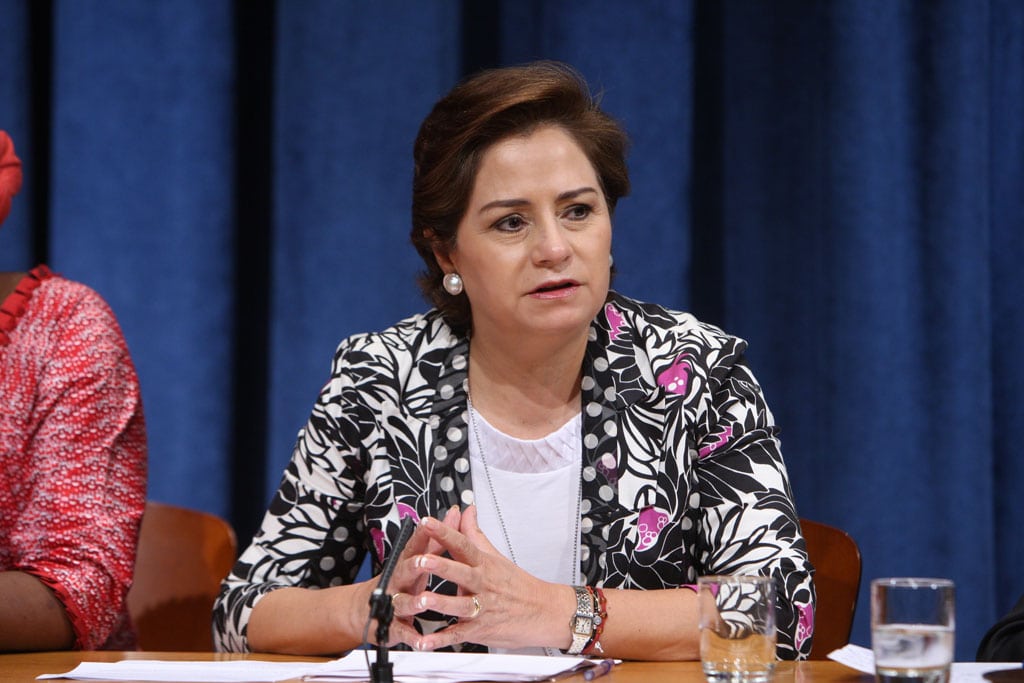
The entry into force Friday of the Paris Agreement was a major milestone, but significant challenges remain in implementing the climate change accord, the United Nations’ top climate official said Monday.
Patricia Espinosa, executive secretary of the U.N. Framework Convention on Climate Change, gave the opening address at the 22nd session of the Conference of Parties (COP22) to the UNFCCC in Marrakesh, Morocco.
The Paris Agreement was adopted last December at COP21 and advanced much faster than anticipated past its entry into force threshold: ratification by at least 55 nations representing 55 percent of global greenhouse gas emissions. As of Monday it had 102 member nations, each of which have offered “nationally determined contributions” to help curb global temperature rise to “well below” 2 degrees Celsius. Delegates at COP22, which continues through Nov. 18, will focus on financing — particularly for developing nations — and other matters needed to implement the agreement.
“Achieving the aims and ambitions of the Paris Agreement is not a given. We have embarked on an effort to change the course of two centuries of carbon-intense development. The peaking of global emissions is urgent, as is attaining far more climate-resilient societies,” Espinosa said. “Marrakesh is our moment to take forward climate action at the international and national levels as a central pillar of the Sustainable Development Goals. This is our opportunity to take the next steps towards an inclusive, sustainable path for every man, woman, and child.”
Espinosa highlighted five areas for prompt attention:
- While there is global financing for climate activities, more is needed. Developed nations have pledged to provide $100 billion per year by 2020 for developing states. “It has to reach the level and have the predictability needed to catalyze low-emission and climate-resilient development,” Espinosa said.
- Governments must now integrate their nationally determined contributions into their policies and investment plans.
- Climate change adaptation demands more attention, and advancements on a loss and damage mechanism is necessary “to safeguard development gains in the most vulnerable communities.”
- Developing nations’ capacity-building requirements must be addressed “in a manner that is both tailored and specific to their needs.”
- Stakeholders that are not party to the accord must be comprehensively engaged, given their crucial role in global efforts for “transformative change.”
“Our work here in Marrakesh must reflect our new reality,” Espinosa said. “No politician or citizen, no business manager or investor can doubt that the transformation to a low-emission, resilient society, and economy is the singular determination of a community of nations.”
Discussions with delegations have highlighted three priority areas, COP22 President Salaheddine Mezouar told reporters on Monday: finance, capacity building, and the transfer of technology. “If we want things to go fast we have to find solutions to the practical aspects,” Mezouar, Morocco’s foreign minister, said through a translator.
Much of the first day of COP22 was taken up by a plenary session of the Subsidiary Body for Implementation of the Paris Agreement, including reports from committees on adaptation and loss and damage, and statements from national delegations. Several committee meetings were scheduled for later in the afternoon.
The COP began its second session Tuesday with additional statements from UNFCCC parties. A number of side events and press conferences were also scheduled through the day, which was designated as “Forest Day.”
Also on Tuesday’s agenda was a workshop on “Modalities for the accounting of financial resources provided and mobilized through public interventoin in accordance with Article 9, paragraph 7, of the Paris Agreement.”